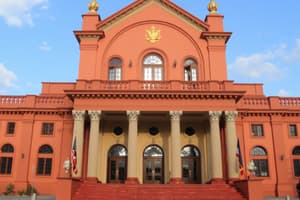Podcast
Questions and Answers
The Organ Bank Storage Facility is a facility licensed, accredited or approved under the law for storage of ______ bodies or parts thereof.
The Organ Bank Storage Facility is a facility licensed, accredited or approved under the law for storage of ______ bodies or parts thereof.
human
A 'Decedent' is a deceased individual, and includes a still-born infant or ______.
A 'Decedent' is a deceased individual, and includes a still-born infant or ______.
fetus
An individual who makes a legacy of all or part of his body is called a ______.
An individual who makes a legacy of all or part of his body is called a ______.
Testator
An individual authorized under this Act to donate all or part of the body of a decedent is called a ______.
An individual authorized under this Act to donate all or part of the body of a decedent is called a ______.
A 'Part' includes transplantable organs, tissues, eyes, bones, arteries, blood, other fluids, and other portions of the human ______.
A 'Part' includes transplantable organs, tissues, eyes, bones, arteries, blood, other fluids, and other portions of the human ______.
A person shall be medically and legally dead if either: 1) In the opinion of the attending physician, based on the acceptable standards of medical practice, there is an absence of natural respiratory and cardiac functions and, attempts at resuscitation would not be successful in restoring those functions. In this case, death shall be deemed to have occurred at the time these functions ceased; or 2) In the opinion of the consulting physician, concurred in by the attending physician, that on the basis of acceptable standards of medical practice, there is an irreversible cessation of all ______ functions; and considering the absence of such functions, further attempts at resuscitation or continued supportive maintenance would not be successful in restoring such natural functions. In this case, death shall be deemed to have occurred at the time when these conditions first appeared.
A person shall be medically and legally dead if either: 1) In the opinion of the attending physician, based on the acceptable standards of medical practice, there is an absence of natural respiratory and cardiac functions and, attempts at resuscitation would not be successful in restoring those functions. In this case, death shall be deemed to have occurred at the time these functions ceased; or 2) In the opinion of the consulting physician, concurred in by the attending physician, that on the basis of acceptable standards of medical practice, there is an irreversible cessation of all ______ functions; and considering the absence of such functions, further attempts at resuscitation or continued supportive maintenance would not be successful in restoring such natural functions. In this case, death shall be deemed to have occurred at the time when these conditions first appeared.
The death of the person shall be determined in accordance with the acceptable standards of medical practice and shall be diagnosed separately by the attending physician and another consulting physician, both of whom must be appropriately qualified and suitably experienced in the care of such patients. The death shall be recorded in the patient’s ______.
The death of the person shall be determined in accordance with the acceptable standards of medical practice and shall be diagnosed separately by the attending physician and another consulting physician, both of whom must be appropriately qualified and suitably experienced in the care of such patients. The death shall be recorded in the patient’s ______.
Any individual, at least eighteen (18) years of age and of sound mind, may give by way of legacy, to take effect after his death, all or part of his body for any purpose specified in Section 6 ______.
Any individual, at least eighteen (18) years of age and of sound mind, may give by way of legacy, to take effect after his death, all or part of his body for any purpose specified in Section 6 ______.
Any of the following persons, in the order of priority stated hereunder, in the absence of actual notice of contrary intentions by the decedent or actual notice of opposition by a member of the immediate family of the decedent, may donate all or any part of the decedent’s body for any purpose specified in Section 6 ______: 1) Spouse; 2) Son or daughter of legal age; 3) Either parent; 4) Brother or sister of legal age; or 5) Guardian over the person of the decedent at the time of his death.
Any of the following persons, in the order of priority stated hereunder, in the absence of actual notice of contrary intentions by the decedent or actual notice of opposition by a member of the immediate family of the decedent, may donate all or any part of the decedent’s body for any purpose specified in Section 6 ______: 1) Spouse; 2) Son or daughter of legal age; 3) Either parent; 4) Brother or sister of legal age; or 5) Guardian over the person of the decedent at the time of his death.
The persons authorized by sub-section (a) of this section may make the donation after or immediately before ______.
The persons authorized by sub-section (a) of this section may make the donation after or immediately before ______.
Flashcards
Organ Bank Storage Facility
Organ Bank Storage Facility
A facility licensed, accredited, or approved under the law for storing human bodies or parts.
Decedent
Decedent
A deceased individual, including a still-born infant or fetus.
Testator
Testator
An individual who makes a legacy of all or part of their body after death.
Donor
Donor
Signup and view all the flashcards
Part
Part
Signup and view all the flashcards
Brain Death
Brain Death
Signup and view all the flashcards
Medical Record
Medical Record
Signup and view all the flashcards
Legacy of body
Legacy of body
Signup and view all the flashcards
Authorized Donors
Authorized Donors
Signup and view all the flashcards
Study Notes
Organ Donation Act of 1991
- This Act allows individuals to donate their bodies or parts of their bodies after death for specified purposes.
Definitions
- An "Organ Bank Storage Facility" is a licensed or accredited facility for storing human bodies or parts.
- A "Decedent" is a deceased individual, including stillborn infants or fetuses.
- A "Testator" is an individual who makes a legacy of all or part of their body.
- A "Donor" is an individual authorized to donate all or part of the body of a decedent.
- A "Hospital" is a licensed or accredited hospital, including government-operated hospitals.
- A "Part" includes transplantable organs, tissues, eyes, bones, arteries, blood, and other fluids and portions of the human body.
Death and Medical Practice
- Death is defined as the irreversible cessation of circulatory and respiratory functions or the irreversible cessation of all brain functions.
- A person is medically and legally dead if:
- In the opinion of the attending physician, natural respiratory and cardiac functions have ceased and attempts at resuscitation would not be successful.
- In the opinion of the consulting physician, there is an irreversible cessation of all brain functions.
Executing a Legacy or Donation
- Any individual aged 18 or older and of sound mind may give all or part of their body by legacy after death for specified purposes.
- Authorized persons who may donate all or part of a decedent's body include:
- Spouse
- Son or daughter of legal age
- Either parent
- Brother or sister of legal age
- Guardian over the person of the decedent at the time of death
Studying That Suits You
Use AI to generate personalized quizzes and flashcards to suit your learning preferences.




